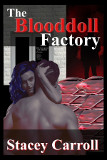- Details
- Hits: 1522
Do you ever read a passage in a novel that makes your pulse quicken, your cheeks flush, and your thoughts wander into slightly... naughtier territory? Maybe the words send butterflies fluttering in your stomach—or, let’s be honest, stir things up a little lower down. A well-written steamy scene can feel like stumbling onto someone’s secret diary. You could stop reading—but why would you, when it’s just getting to the good part?
Let’s get this out of the way: there’s nothing wrong with enjoying erotica. In fact, reading erotic literature—affectionately known as literotica—comes with some surprising and (ahem) satisfying benefits. So if you’ve ever felt guilty for getting a little hot under the collar with your Kindle, rest easy. You're not only completely normal—you’re actually onto something good.
Read more: Sparks Fly in Erotic Literature: Reclaim Your Pleasure With Erotica Books

- Details
- Hits: 7971
When is the last time you purchased a book from an independently published author? If you’re just buying books from the Big 5 or 7, depending on which stats you read, you could be missing out. Independently published authors are the fastest growing segment of the book industry, and they are writing stories and self help books and nonfiction about every topic you could possible think of.
1. The Variety Is Endless.
The variety of books is endless. Independently published books now make up about 30 percent of the total market, and indie authors are writing everything. If you want an LGBT book set in space, there’s an indie author that wrote it. If you want a vampire romance set in the 1800s, there’s a indie author that wrote it. If you want a space nightmare, it’s out there. If you want a fetish book about worm sex, some independently published author is or has wrote it.
Read more: 5 Benefits of Buying and Reading Independently Published Books

- Details
- Hits: 6989
How many books do you read a year? According to Statista, 9% of individuals read up to 3 books each year. Thirteen percent of individuals read up to 5 books per year. Twenty percent of individuals read up to 10 books per year, and 17 percent of individuals read up to 15 books per year. This means that 59% of the population reads books and 41 percent of people either read more than 15 books per year or 0 books per year. The truth of the matter is that everyone should read more fiction books because they will stimulate your brain, improve your creativity and expand your critical thinking skills. You may even be warding off dementia.
1 . You’ll Expand Your Vocabulary
Reading fiction can help you expand your vocabulary faster than reading a dictionary or thesaurus, and it will give you the ability to use the new words. This is because fiction writers often strive to use the most accurate word available to describe a scene, character emotion or action. Some new words I’ve run across while reading fiction include maudlin, abominable, repugnant, unprepossessing and nefarious. If you know what these words mean, that’s fantastic, you can learn even more. If you have never heard of or used these words, you can learn the definitions of these, use them and learn the definitions and uses of even more words.

- Details
- Hits: 6928
Romance and Erotica: How Do They Compare?
The genres of Romance and erotica are similar, but also very different. Romance tends to have a plot that centers around a relationship. Erotica may or may not have a plot, depending on the author. There's a subgenre called romantic erotica, which contains the same plots as a traditional romance book but the sex scenes are explicit as if it were an erotica book.
Read more: The Differences Between Romance and Erotica in Fiction

- Details
- Hits: 7216
About to lose his home to foreclosure and unable to pay mounting bills, unemployed nurse William Wilson applies for a fertility specialist position with Elite Surrogates and Adoption (ESA) that seems too good to be true. Not only is he not expected to explain the reasons he left his previous hospital position after twenty years, he is offered above-average hourly pay and an extravagant sign on bonus. Both are explained during Wilson’s nontraditional employment interview with HR Manager Sadie Jones, where he is asked to prove that his sexual abilities are up to par with ESA's standards. The author's description of Wilson's first encounter with Sadie will leave the reader wanting more. Sadie's apparent experience with testing potential fertility specialists and Wilson's willingness to do anything it takes to secure employment with ESA suggest that their initial chemistry will continue to build as the story unfolds.






